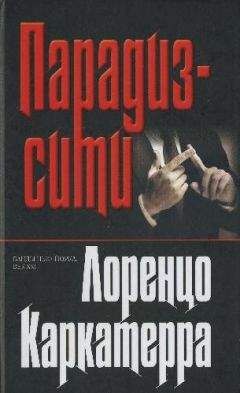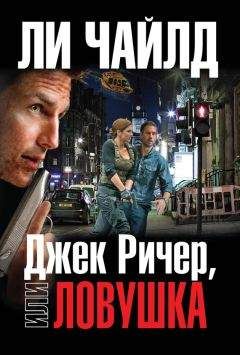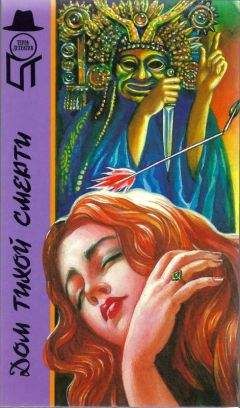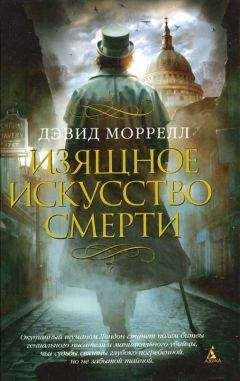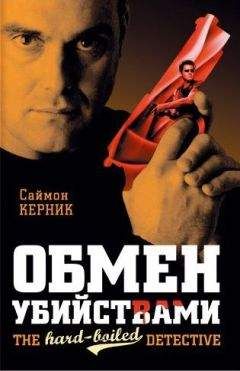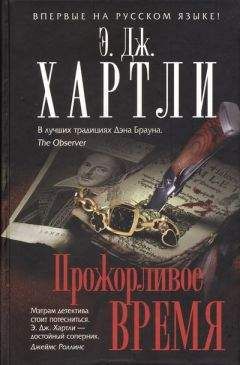Ли Чайлд - "Этаж смерти" with W_cat
Скачивание начинается... Если скачивание не началось автоматически, пожалуйста нажмите на эту ссылку.
Жалоба
Напишите нам, и мы в срочном порядке примем меры.
Описание книги ""Этаж смерти" with W_cat"
Описание и краткое содержание ""Этаж смерти" with W_cat" читать бесплатно онлайн.
Маргрейв — крохотный идеальный городок. Настолько идеальный, что это пугает.
Бывший военный полицейский Джек Ричер, ведущий кочевой образ жизни, приходит в Маргрейв, намереваясь покинуть город через пару дней. Однако в этот момент в Маргрейве происходит первое убийство за тридцать лет. Его вешают на Ричера, единственного чужака в городе. И для него начинается кошмар... первым действием которого становятся выходные в тюрьме, на этаже смерти, в обществе заключенных, отбывающих пожизненное заключение.
По мере того, как начинают просачиваться отвратительные тайны смертельного заговора, поглотившего весь город, растет счет трупам. И смерть становится эпидемией.
[36] The woman unloaded the camera and put the film with the prints card on the table. She repacked the camera into the flight case. Baker rapped on the door. The lock clicked again. The woman picked up her stuff. Nobody spoke. The woman left the room. Baker stayed in there with me. He shut the door and it locked with the same greased click. Then he leaned on the door and looked at me.
[37] “My chief’s coming on down,” he said. “You’re going to have to talk to him. We got a situation here. Got to be cleared up.”
[38] I said nothing back to him. Talking to me wasn’t going to clear any situation up for anybody. But the guy was acting civilized. Respectful. So I set him a test. Held out my hands toward him. An unspoken request to unlock the cuffs. He stood still for a moment then took out the key and unlocked them. Clipped them back on his belt. Looked at me. I looked back and dropped my arms to my sides. No grateful exhalation. No rueful rubbing of my wrists. I didn’t want a relationship with this guy. But I did speak.
[39] “OK,” I said. “Let’s go meet your chief.”
[40] It was the first time I’d spoken since ordering breakfast. Now Baker was the one who looked grateful. He rapped twice on the door and it was unlocked from the outside. He opened it up and signaled me through. Stevenson was waiting with his back to the large open area. The shotgun was gone. The backup crew was gone. Things were calming down. They formed up, one on each side. Baker gripped my elbow, lightly. We walked down the side of the open area and came to a door at the back. Stevenson pushed it open and we walked through into a large office. Lots of rosewood all over it.
[41] A fat guy sat at a big rosewood desk. Behind him were a couple of big flags. There was a Stars and Stripes with a gold fringe on the left and what I guessed was the Georgia state flag on the right. On the wall between the flags was a clock. It was a big old round thing framed in mahogany. Looked like it had decades of polish on it. I figured it must be the clock from whatever old station house they bulldozed to build this new place. I figured the architect had used it to give a sense of history to the new building. It was showing nearly twelve thirty.
[42] The fat guy at the big desk looked up at me as I was pushed in toward him. I saw him look blank, like he was trying to place me. He looked again, harder. Then he sneered at me and spoke in a wheezing gasp which would have been a shout if it hadn’t been strangled by bad lungs.
[43] “Get your ass in that chair and keep your filthy mouth shut,” he said.
[44] This fat guy was a surprise. He looked like a real asshole. Opposite to what I’d seen so far. Baker and his arrest team were the business. Professional and efficient. The fingerprint woman had been decent. But this fat police chief was a waste of space. Thin dirty hair. Sweating, despite the chilly air. The blotchy red and gray complexion of an unfit, overweight mess. Blood pressure sky-high. Arteries hard as rocks. He didn’t look halfway competent.
[45] “My name is Morrison,” he wheezed. As if I cared. “I am chief of the police department down here in Margrave. And you are a murdering outsider bastard. You’ve come down here to my town and you’ve messed up right there on Mr. Kliner’s private property. So now you’re going to make a full confession to my chief of detectives.”
[46] He stopped and looked up at me. Like he was still trying to place me. Or like he was waiting for a response. He didn’t get one. So he jabbed his fat finger at me.
[47] “And then you’re going to jail,” he said. “And then you’re going to the chair. And then I’m going to take a dump on your shitty little pauper’s grave.”
[48] He hauled his bulk out of the chair and looked away from me.
[49] “I’d deal with this myself,” he said. “But I’m a busy man.”
[50] He waddled out from behind his desk. I was standing there between his desk and the door. As he crabbed by, he stopped. His fat nose was about level with the middle button on my coat. He was still looking up at me like he was puzzled by something.
[51] “I’ve seen you before,” he said. “Where was it?”
[52] He glanced at Baker and then at Stevenson. Like he was expecting them to note what he was saying and when he was saying it.
[53] “I’ve seen this guy before,” he told them.
[54] HE SLAMMED THE OFFICE DOOR AND I WAS LEFT WAITING with the two cops until the chief of detectives swung in. A tall black guy, not old, but graying and balding. Just enough to give him a patrician air. Brisk and confident. Well-dressed, in an old-fashioned tweed suit. Moleskin vest. Shined shoes. This guy looked like a chief should look. He signaled Baker and Stevenson out of the office. Closed the door behind them. Sat down at the desk and waved me to the opposite chair.
[55] He rattled open a drawer and pulled out a cassette recorder. Raised it high, arm’s length, to pull out the tangle of cords. Plugged in the power and the microphone. Inserted a tape. Pressed record and flicked the microphone with his fingernail. Stopped the tape and wound it back. Pressed play. Heard the thunk of his nail. Nodded. Wound back again and pressed record. I sat and watched him.
[56] For a moment there was silence. Just a faint hum, the air, the lights, or the computer. Or the recorder whirring slowly. I could hear the slow tick of the old clock. It made a patient sound, like it was prepared to tick on forever, no matter what I chose to do. Then the guy sat right back in his chair and looked hard at me. Did the steepled fingers thing, like tall elegant people can.
[57] “Right,” he said. “We got a few questions, don’t we?”
[58] The voice was deep. Like a rumble. Not a southern accent. He looked and sounded like a Boston banker, except he was black.
[59] “My name is Finlay,” he said. “My rank is captain. I am chief of this department’s detective bureau. I understand you have been apprised of your rights. You have not yet confirmed that you understood them. Before we go any further we must pursue that preliminary matter.”
[60] Not a Boston banker. More like a Harvard guy.
[61] “I understand my rights,” I said.
[62] He nodded.
[63] “Good,” he said. “I’m glad about that. Where’s your lawyer?”
[64] “I don’t need a lawyer,” I said.
[65] “You’re charged with murder,” he said. “You need a lawyer. We’ll provide one, you know. Free of charge. Do you want us to provide one, free of charge?”
[66] “No, I don’t need a lawyer,” I said.
[67] The guy called Finlay stared at me over his fingers for a long moment.
[68] “OK,” he said. “But you’re going to have to sign a release. You know, you’ve been advised you may have a lawyer, and we’ll provide one, at no cost to yourself, but you absolutely don’t want one.”
[69] “OK,” I said.
[70] He shuffled a form from another drawer and checked his watch to enter date and time. He slid the form across to me. A large printed cross marked the line where I was supposed to sign. He slid me a pen. I signed and slid the form back. He studied it. Placed it in a buff folder.
[71] “I can’t read that signature,” he said. “So for the record we’ll start with your name, your address and your date of birth.”
[72] There was silence again. I looked at him. This was a stubborn guy. Probably forty-five. You don’t get to be chief of detectives in a Georgia jurisdiction if you’re forty-five and black except if you’re a stubborn guy. No percentage in jerking him around. I drew a breath.
[73] “My name is Jack Reacher,” I said. “No middle name. No address.”
[74] He wrote it down. Not much to write. I told him my date of birth.
[75] “OK, Mr. Reacher,” Finlay said. “As I said, we have a lot of questions. I’ve glanced through your personal effects. You were carrying no ID at all. No driver’s license, no credit cards, no nothing. You have no address, you say. So I’m asking myself, who is this guy?”
He didn’t wait for any kind of a comment on that from me.
[76] “Who was the guy with the shaved head?” he asked me.
[77] I didn’t answer. I was watching the big clock, waiting for the minute hand to move.
[78] “Tell me what happened,” he said.
[79] I had no idea what had happened. No idea at all. Something had happened to somebody, but not to me. I sat there. Didn’t answer.
[80] “What is Pluribus?” Finlay asked.
[81] I looked at him and shrugged.
[82] “The United States motto?” I said. “E Pluribus Unum? Adopted in 1776 by the Second Continental Congress, right?”
[83] He just grunted at me. I carried on looking straight at him. I figured this was the type of a guy who might answer a question.
[84] “What is this about?” I asked him.
[85] Silence again. His turn to look at me. I could see him thinking about whether to answer, and how.
[86] “What is this about?” I asked him again. He sat back and steepled his fingers.
[87] “You know what this is about,” he said. “Homicide. With some very disturbing features. Victim was found this morning up at the Kliner warehouse. North end of the county road, up at the highway cloverleaf. Witness has reported a man seen walking away from that location. Shortly after eight o’clock this morning. Description given was that of a white man, very tall, wearing a long black overcoat, fair hair, no hat, no baggage.”
[88] Silence again. I am a white man. I am very tall. My hair is fair. I was sitting there wearing a long black overcoat. I didn’t have a hat. Or a bag. I had been walking on the county road for the best part of four hours this morning. From eight until about eleven forty-five.
[89] “How long is the county road?” I said. “From the highway all the way down to here?”
[90] Finlay thought about it.
[91] “Maybe fourteen miles, I guess,” he said.
[92] “Right,” I said. “I walked all the way down from the highway into town. Fourteen miles, maybe. Plenty of people must have seen me. Doesn’t mean I did anything to anybody.”
[93] He didn’t respond. I was getting curious about this situation.
[94] “Is that your neighborhood?” I asked him. “All the way over at the highway?”
[95] “Yes, it is,” he said. “Jurisdiction issue is clear. No way out for you there, Mr. Reacher. The town limit extends fourteen miles, right up to the highway. The warehousing out there is mine, no doubt about that.”
[96] He waited. I nodded. He carried on.
[97] “Kliner built the place, five years ago,” he said. “You heard of him?”
[98] I shook my head.
[99] “How should I have heard of him?” I said. “I’ve never been here before.”
[100] “He’s a big deal around here,” Finlay said. “His operation out there pays us a lot of taxes, does us a lot of good. A lot of revenue and a lot of benefit for the town without a lot of mess, because it’s so far away, right? So we try to take care of it for him. But now it’s a homicide scene, and you’ve got explaining to do.”
[101] The guy was doing his job, but he was wasting my time.
[102] “OK, Finlay,” I said. “I’ll make a statement describing every little thing I did since I entered your lousy town limits until I got hauled in here in the middle of my damn breakfast. If you can make anything out of it, I’ll give you a damn medal. Because all I did was to place one foot in front of the other for nearly four hours in the pouring rain all the way through your precious fourteen damn miles.”
[103] That was the longest speech I had made for six months. Finlay sat and gazed at me. I watched him struggling with any detective’s basic dilemma. His gut told him I might not be his man. But I was sitting right there in front of him. So what should a detective do? I let him ponder. Tried to time it right with a nudge in the right direction. I was going to say something about the real guy still running around out there while he was wasting time in here with me. That would feed his insecurity. But he jumped first. In the wrong direction.
[104] “No statements,” he said. “I’ll ask the questions and you’ll answer them. You’re Jack-none-Reacher. No address. No ID. What are you, a vagrant?”
[105] I sighed. Today was Friday. The big clock showed it was already more than half over. This guy Finlay was going to go through all the hoops with this. I was going to spend the weekend in a cell. Probably get out Monday.
[106] “I’m not a vagrant, Finlay,” I said. “I’m a hobo. Big difference.”
[107] He shook his head, slowly.
[108] “Don’t get smart with me, Reacher,” he said. “You’re in deep shit. Bad things happened up there. Our witness saw you leaving the scene. You’re a stranger with no ID and no story. So don’t get smart with me.”
[109] He was still just doing his job, but he was still wasting my time.
[110] “I wasn’t leaving a homicide scene,” I said. “I was walking down a damn road. There’s a difference, right? People leaving homicide scenes run and hide. They don’t walk straight down the road. What’s wrong about walking down a road? People walk down roads all the damn time, don’t they?”
[111] Finlay leaned forward and shook his head.
[112] “No,” he said. “Nobody has walked the length of that road since the invention of the automobile. So why no address? Where are you from? Answer the questions. Let’s get this done.”
[113] “OK, Finlay, let’s get it done,” I said. “I don’t have an address because I don’t live anywhere. Maybe one day I’ll live somewhere and then I’ll have an address and I’ll send you a picture postcard and you can put it in your damn address book, since you seem so damn concerned about it.”
[114] Finlay gazed at me and reviewed his options. Elected to go the patient route. Patient, but stubborn. Like he couldn’t be deflected.
[115] “Where are you from?” he asked. “What was your last address?”
[116] “What exactly do you mean when you say where am I from?” I asked.
His lips were clamped. I was getting him bad-tempered, too. But he stayed patient. Laced the patience with an icy sarcasm.
[117] “OK,” he said. “You don’t understand my question, so let me try to make it quite clear. What I mean is, where were you born, or where have you lived for that majority period of your life which you instinctively regard as predominant in a social or cultural context?”
[118] I just looked at him.
[119] “I’ll give you an example,” he said. “I myself was born in Boston, was educated in Boston and subsequently worked for twenty years in Boston, so I would say, and I think you would agree, that I come from Boston.”
[120] I was right. A Harvard guy. A Harvard guy, running out of patience.
[121] “OK,” I said. “You’ve asked the questions. I’ll answer them. But let me tell you something. I’m not your guy. By Monday you’ll know I’m not your guy. So do yourself a favor. Don’t stop looking.”
[122] Finlay was fighting a smile. He nodded gravely.
[123] “I appreciate your advice,” he said. “And your concern for my career.”
[124] “You’re welcome,” I said.
[125] “Go on,” he said.
Подписывайтесь на наши страницы в социальных сетях.
Будьте в курсе последних книжных новинок, комментируйте, обсуждайте. Мы ждём Вас!
Похожие книги на ""Этаж смерти" with W_cat"
Книги похожие на ""Этаж смерти" with W_cat" читать онлайн или скачать бесплатно полные версии.
Мы рекомендуем Вам зарегистрироваться либо войти на сайт под своим именем.
Отзывы о "Ли Чайлд - "Этаж смерти" with W_cat"
Отзывы читателей о книге ""Этаж смерти" with W_cat", комментарии и мнения людей о произведении.





